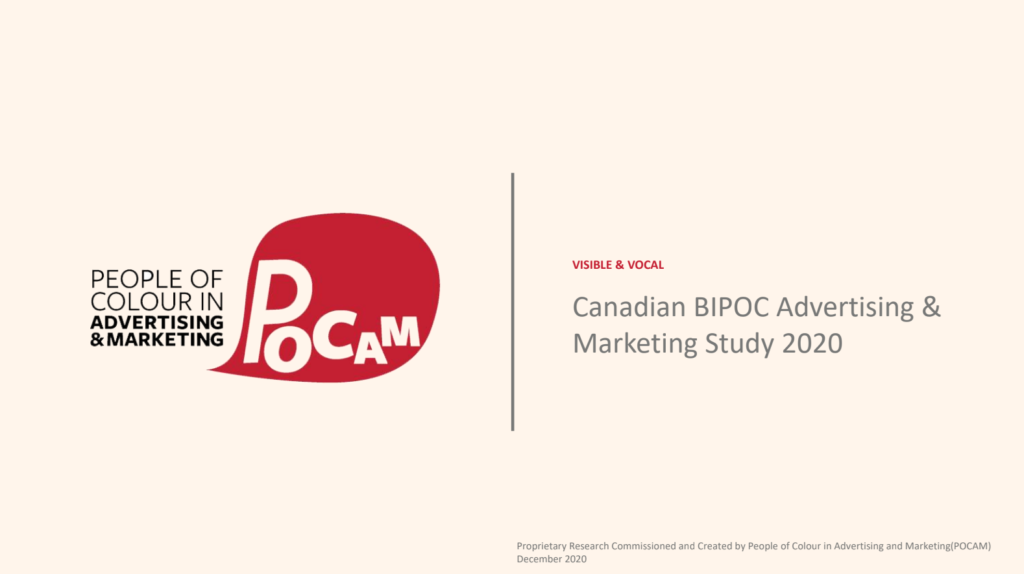There’s lots of variations of the phrase “what gets measured gets done.” For instance, “what gets measured gets managed.” Plus, there’s “what you cannot measure you cannot improve.” Regardless of the nuance, the core insight is there. If you can’t quantify a situation, it’s tough to remedy it. For Black, Indigenous and People of Colour or BIPOC marketers in Canada, this unfortunately was the reality until early 2021. There simply wasn’t a dataset that explored the profiles, perspectives and experiences of BIPOC marketing and advertising professionals.
A new organization called POCAM (People of Colour in Advertising & Marketing) is filling that gap with a new study. As the organization notes, sometimes being seen begins with being heard. So, In Partnership With reached out to POCAM to explore the research results further. Julian Franklin, experienced senior marketer, co-Founder of POCAM and President of the Franklin Management Group, shared his thoughts on this important topic. Additionally, the two presenters of a recent POCAM presentation shared their thoughts. They both work as leaders at john st., a leading marketing agency in Toronto. Chasson Gracie is the Director, Insights and Analytics and a member of the agency Leadership Team while Joshua Richards is the Director, Creative Technology and is the Diversity & Inclusion Lead. Joshua is also a proud co-Founder of POCAM.
In Partnership With strives to ensure that this platform supports important diversity and inclusion efforts by being representative of the contemporary Canadian landscape.
To continue these efforts, this space has devoted the month of February, Black History Month, with its weekly releases of articles. This month, In Partnership With is exclusively sharing the new, expert perspectives of members of the BIPOC marketing community. In addition, In Partnership With has signed on to the POCAM Call for Equity pledge to creating equality in the Canadian marketing industry. Your organization should consider it, too.
Visible & Vocal: The 2021 POCAM Study
The results are clear due to the over 300 responses from members of the BIPOC marketing community in Canada. There’s now a definitive understanding that most BIPOC marketers suffer from microaggressions. Further, most have received a lack of career guidance and support. As a result, there’s limited advancement opportunities for many.
Half of BIPOC respondents reported experiencing racial discrimination in the workplace.
Fortunately, most respondents feel like there is a new awareness and in some cases, progress underway. Unfortunately, there is also a perception of “all talk, no action” by some non-BIPOC executives in charge. This needs to change since there are significant opportunities for businesses to embrace diversity – not to mention simply being the right thing to do.

Biggest Surprises for BIPOC Marketers
Any time you seek to tangibly validate perceptions, there’s bound to be things that catch the eye. For Chasson, the biggest surprise was that survey respondents wanted POCAM to be a vocal advocate for the BIPOC community. He was expecting to see a more muted set of next steps. That’s clearly not the case here. There’s an urgency in the air for change. For Josh, it wasn’t a surprise per se but rather was a validation of how a lot of members of the BIPOC community are feeling right now. Now it’s known to be a wider issue. It’s not just a single person’s experience. This is a systemic issue.
Julian agrees. The near-uniformity of what the respondents were saying is extremely helpful. To now have the data to prove the long-standing perceptions was important for him. What is surprising for Julian was the fact that for so long, there was no real standard for BIPOC within the industry.
It’s important to set that bar to say that “this is the new standard. We’re not going back. We’re not going to get lost or confused.”
Looking forward, Julian suggests the data is going to help the BIPOC community set a clear path. This study has a significant, statistically sound response. You can’t dismiss that. To have that clarity, uniformity and seeing some of the results was pleasantly surprising for him.
Reactions by BIPOC Marketers from the POCAM Study
With the fact-based understanding of the situation in the marketing profession for BIPOC practitioners, it was apparent that there was some relief. Chasson heard from members of the Canadian BIPOC community who felt that their experiences were finally validated with Canadian insights. Things are not perfect here and it’s now impossible to try to say that it is (versus insights from other country’s studies). Plus, from this new validation, it gave hope for the potential for real change with POCAM leading the charge.
There is now a perception that POCAM is not just sharing the numbers, rather, giving the community a way forward; that there is a serious effort here to change things.
Josh has experienced similar feedback. It has been very positive in that some agencies have reached out asking for the report. Not just that, but now they can start using the results as a baseline for their own data and their own efforts to act against racism. Josh continues that the results are especially helpful since the respondents are not just numbers. These are human beings in organizations who have been feeling this way; they have been experiencing microaggressions and racial discrimination. Josh is excited that he’s hearing you can’t dispute it anymore.
Building on this, Julian agrees that the feedback has been really positive from people in his network. The postings, comments and likes have been encouraging. That said, members of POCAM had guarded themselves for the potential there could be backlash. Thankfully, Julian notes, that has not happened. The positivity, for sure, has been has been so appreciated and he’s hoping that continues.
Industry Advice Based on the Study Results
The good news is that the results have been clear, widely shared and positively received (despite the challenges laid bare in the results). The big question now is where does the marketing profession go from here to make real change?
For Chasson, he argues there’s value in diversity and different perspectives. For creatives, when considering the processes for solving client needs, there needs to be BIPOC representation from the beginning. And, he continues, that doesn’t just mean people working at the agency. It also means those people who are taking the surveys, evaluating the prototypes and things of that nature.
Chasson notes that when it comes to many market research firms, they do not make an effort to balance their samples outside of age, gender and region. Often, culture doesn’t register as a factor. The problem with that is you’re not really representing all in Canada. You cannot represent all of Canada just based upon those three variables. Research needs to involve a broad section of Canadians. Moreover, we know from scientific research that humans are better at solving a problem when you have a diverse set of people at the table. BIPOC consumers and marketers help fulfil this need and can strengthen your processes and outputs.
BIPOC Marketers Progressing into Leadership
Looking at this question from a hiring and talent celebration perspective, Josh sees a real need for BIPOC marketers to be more represented in positions of leadership.
There are so few BIPOC leaders which makes it more difficult for new marketers to see themselves in the profession longer term.
This means there are fewer supports and mentors to guide the way. Finally, Josh sees a need for leaders to acknowledge the broad set of talent that contributes to great work. Too often, the research – and lived experience – shows, that junior marketers are left off the credits for great work. And since the majority of BIPOC marketers are still in the earlier parts of their career, there’s a lack of celebration of their efforts.
Julian agrees and suggests that there needs to be a more concerted approach for leading marketing associations in Canada to do more. For instance, there needs to be BIPOC-focused committees that speak to the unique experience in the profession. That’s a huge gap right now and Julian would like to see that change. Then, by being invited to the table to discuss these specific issues, there can be a critical mass to fight upstream. To move into positions of power and inspire others.
Next Steps for POCAM
Looking forward, members of POCAM are continuing to organize and strategize to develop the right organizational structure to continue the momentum. Perhaps it’s a nonprofit or another structure the POCAM leadership finds to support the mission and vision. Then, once more fully established, plan out what the projects are and expand. But first, it’s about expanding the list of organizations participating in the Call For Equity. Currently, there are 77 organizations listed and they should expect to be held accountable for their pledges. POCAM will be doing exactly that in the future.
Continuing, Josh notes that there is a need for accountability and that is best achieved with objective specificity. It’s not about hiring a bunch of junior marketers and claiming that the POCAM Call for Equity pledge has been fulfilled. Sure, as a proportion of hires or roles in a firm, that may suit the pledge but it’s more about driving real results all the way up the corporate ladder.
As a Co-Founder of POCAM, Julian is focused on growth. This includes more members, more connectivities, more of a mature established network. More connections into the group and other groups like POCAM. There’s Code Black, the Black Talent Initiative and others. In most cases, they’re all quite new and Julian would like to see them in the next year or two become solid pillars of the marketing and advertising community. He continues that there’s an unmet need by some of those institutional industry associations. That’s why these BIPOC groups have had to start up to fill that gap.
Fortunately, that gap is closing with these efforts. Since we believe that “what gets measured gets done” then POCAM already off and running full speed ahead to make the change this industry needs.
In Partnership With
People Of Colour in Advertising And Marketing (POCAM) was founded as an industry organization in 2020. With over 800 members and growing, this effort was Founded by Alyssa Dominique, Stephanie Small, Joshua Richards, Julian Franklin, Justin Senior and Gavin Barrett. Incorporation as a non-profit is currently underway. The organization has its roots in POCA, a LinkedIn group launched by Stephanie Small in 2019.
Tim Bishop, CM is a multi-disciplined executive with a proven record of optimizing strategic efforts to expand the influence of leading organizations, such as the Canadian Marketing Association, Cineplex Entertainment, Lavalife.com, IMI International and Northstar Research Partners. In Partnership With is his latest focus to curate Canadian marketing experts to celebrate the power of strategic partnerships in a perspective-based content series.

